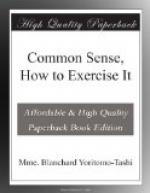“One moment would, however, suffice for reason to convince them that the variations of atmosphere and the conditions of cultivation can modify the aspect of a country, of a field, and of a house, to the extent of giving them an appearance totally different from the one which they seemed to have.
“But he who judges by appearances never rejoices in the possession of that faculty which may be called reason in imagination.
“This is a gift, developed by practical sense and which common sense happily directs in right channels.
“Those who are endowed with this faculty can, with the help of reasoning, and by means of thought, build up a future reality based on a judgment whose affirmation admits of no doubt.
“It is not a question of hypothesis, no matter how well-founded it is.
“Experience, in this case, is united with deduction to form a preconceived but certain idea.
“By cultivating practical sense, we shall escape the danger of idealization which, with people of unbalanced mentality, often sheds an artificial light upon the picture.”
There is still another point to which Yoritomo calls our attention, in order to encourage us to cultivate the twin reasoning powers whose advantages we are trying to commend in this chapter:
“Practical sense,” says he, “sometimes puts common sense apparently in the wrong, while acting, however, without the inspiration of the latter.
“This happens when it is an advantage, for the perfect equilibrium of the projects in question, that it should be maintained at the same pitch, in order that it may be understood by all.
“In the legendary days, snow the color of fire once fell on the inhabitants of a little village, who were all about to attend a religious ceremony.
“One man alone, an old philosopher, had remained at home because, at the time they were to leave, he suddenly fell ill.
“When his sufferings were relieved, he started out to join the others and found them committing all sorts of follies.
“Two among them were reviling one another, each one claiming that he was the only king.
“Some were weeping because they thought that they were changed into beasts.
“Others were screaming, without rime or reason, now embracing each other, now attacking one another furiously.
“Soon the wise man recognized that they had been affected by the fall of snow, which had made them crazy, and he tried to speak to them in the language of reason.
“But all these crazy people turned on him, crying out that he had just lost his reason and that he must be shut away.
“They undertook the task of taking him back to his home, but, as that was not to be accomplished without rough usage, he assumed the part indicated by practical sense; this man of common sense feigned insanity, and from the moment the insane people thought that he resembled them they let him alone and ceased to torment him.




